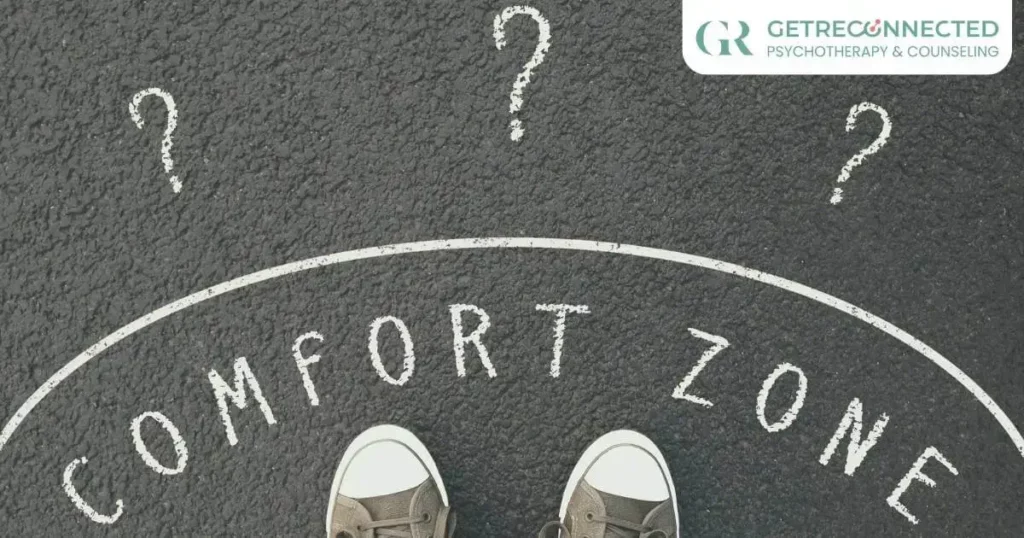Starting therapy for the first time can be a daunting experience. You might be nervous, skeptical, or even afraid of how therapy can unravel for you. But therapy is a collaborative process and part of your therapist’s job is to make you feel comfortable and help you get all you can out of your sessions with them.
Despite the fact that therapy has become increasingly popular and accessible, many people still have reservations about therapy and what to expect during their first session. You might wonder what kinds of questions your therapists will ask or what topics you’ll need to discuss. Keep in mind that therapists are trained professionals who aim to help you navigate your emotions and challenges.
While it’s natural to feel a bit nervous about starting therapy, it’s important to remember that it is a 2-person endeavor. It’s like you join a team and then work together to find the solutions to whatever mental health struggles you may have.
Taking the time to find the right therapist and building a strong relationship can help you get the most out of your therapy sessions, as can learning how to communicate honestly and be prepared to take risks.
A successful therapy journey begins with understanding what you can expect and how to make the most of each session. It’s hard at time, but the rewards are worth it.
If you can have a better understanding of what is involved in therapy, then it might give you some idea of how you can prepare for it and what you can do to make it rewarding and successful. This content is crucial for those looking to embark on a therapeutic journey.
Here are some tips and guides on how to get the most out of therapy:
Table of Contents
ToggleFinding the right therapist is a must for getting the most out of therapy. It’s important to find a therapist who is a good fit for you, that you genuinely like and trust. You should feel at ease opening up to therapists, and be confident that they won’t judge you. Think about it, in therapy you talk a lot, and it matters if you feel open to your therapist so you can talk about what is going on for you.
If you’re doing couples therapy, make sure both you and your partner feel comfortable sharing with the therapist. If one of you doesn’t feel a good connection, it might hinder your ability to express your feelings and work through relationship issues.

While the therapeutic relationship may feel supportive and empathetic, it’s essential to recognize that your therapist is a professional and not a friend. The therapist is there to provide a professional service.
Although the relationship between you and your therapist may be one of mutual respect, it is still one of a professional nature. A therapist is there to provide guidance and support, but in a professional capacity. This means they won’t always agree with you or take your side, and they will challenge you if they believe it is necessary.
Be open about your emotions
One of the most powerful aspects of therapy is that it gives you a safe space to open up and be honest about your emotions. While it can be intimidating to discuss our emotions and vulnerabilities, it is essential to share your innermost thoughts and feelings in order to get the most out of your therapy session.
Authenticity is key to the therapeutic process. Don’t shy away from sharing your true emotions and experiences. Keep in mind, therapy is a place where you can speak freely and not worry about being judged. It is also okay to ask your therapist to wait before delving into a certain topic. Healing and processing should happen at a pace that feels comfortable for you.

Step out of your comfort zone
Therapy is an opportunity to learn and grow, and sometimes that means stepping out of your comfort zone. Venturing out of your comfort zone in therapy can bring about positive changes in your life. Though it might also present challenges, as confronting deep-seated emotions and past experiences can be daunting and emotionally taxing. Yet, facing these emotions is ultimately beneficial. By addressing and processing them, we can pave the way for healing, self-awareness, and personal growth.

Define and clarify what you want to get out of sessions
Making the most of your therapy sessions means having clear goals in mind. Defining what you want to get out of the sessions can help you stay focused on the topics that you need to address, and help your therapist understand what kind of support is needed.
When setting goals for therapy, it is important to be realistic of what you want to accomplish in sessions. You should set goals that are SMART – specific, measurable, achievable, realistic, and timely. You should also make sure that your goals are within your control.
Set realistic expectations for yourself
It is not uncommon to expect quick results, but know that the process sometimes can be slow and gradual. Success in therapy also correlates with the effort you invest. If you are not actively engaging in the process, it will take longer to achieve your goals.
While therapy can be incredibly beneficial, it is not a magic solution. It is not a quick fix. You should not put too much pressure on yourself and remember to be kind and gentle with yourself. Lasting changes require time, so grant yourself patience and room to grow.

Don’t hesitate to communicate with your therapist about what isn’t working
Communication is key in any successful relationship, and that certainly holds true when it comes to therapy. If something isn’t working or you’re experiencing discomfort, do mention it to your therapist. At first, it may feel strange to tell your therapist what you don’t like, but it’s essential to successful therapy. By giving constructive feedback, you can let your therapist know what works for you and what doesn’t. Your therapist can then adjust their approach to better meet your needs.

Voice the thoughts you’re typically hesitant to express
Being honest and open about your feelings in therapy can be daunting. It’s natural to want to avoid talking about uncomfortable topics, so it’s important to push yourself beyond your comfort zone. By talking about the topics that make you uncomfortable, you can explore and work through them in a safe and supportive environment.
The benefits of speaking openly can be immense. It can help you to get to the root of the problem, understand how it’s impacting your life and find ways to move forward. Start by preparing yourself each session. Write down the topics you want to discuss and the questions you want to ask. This can help you to focus and stay on track during the session.
It can also be helpful to think about the reasons why you’re uncomfortable talking about something. If it’s too overwhelming, try to break it down into smaller, more manageable pieces.

Be patient, growth is a journey that takes time and persistent effort
Therapy is often referred to as a journey, and like any journey, it takes time and effort. Positive change won’t happen overnight. It’s important to be patient with yourself and with the process.
Remember, therapy might sometimes feel challenging and unsettling. You might feel like you’re taking two steps forward and one step back. That’s why allowing yourself time to heal and progress, and being patient with the journey, is essential!
Also, keep in mind that everyone progresses at their own pace. Everyone has their own unique journey, and you need to be mindful of this when it comes to your expectations.

Celebrate the small wins along your journey. Whether it’s making progress on a goal, uncovering a new insight, or simply having an emotionally healthy week, acknowledging your successes and progress is a great way to stay motivated.
Therapy isn’t solely about eliminating negative emotions. It’s also about finding joy and developing a deeper understanding of yourself. As you become more aware of your needs, wants, and feelings, you can start to make healthier decisions and create a more fulfilling life. Remember, therapy can be a tool to address anxiety, depression, and other mental health issues, but it requires your active participation and commitment.

Delia Petrescu
Founder & Director
BA, MA, Registered Psychotherapist (RP)
Delia Petrescu, MA, RP is a Toronto-based psychotherapist, psychometrist, and the founder of Get Reconnected Psychotherapy and Counselling Services. She provides virtual therapy sessions Ontario-wide. Delia has experience working with adults struggling with adjustment difficulties, depression, anxiety, and trauma. She specializes in integrative and holistic care for those coping with life crises such as fertility concerns. Read more about Delia

Two-Week Wait After IVF: 13 Tips To Survive the Toughest Part of Fertility Treatments
If you’ve been trying to get pregnant for a while and recently went through IVF, you know that waiting to find out if it worked

Finding Hope Through The Infertility Journey
Explore the emotional landscape of infertility at Get Reconnected. Learn how to cultivate hope and resilience during your fertility journey.

Surviving Infertility: Coping with the Ups and Downs
Learn effective coping strategies for the emotional challenges of infertility. Discover support and guidance for your journey at Get Reconnected.




